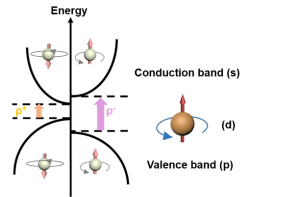Summary
Leakage current in electronic components is one of the limiting factors for the performance of conventional computers which use charges and currents as physical information carriers. Spintronics offers an alternative by using electron spin for information transfer, processing and storage, enabling the design of non-volatile computer memory and more energy-efficient electronic devices. In this project, we develop a new class of low-dimensional quantum materials for spintronics applications, which are based on colloidal metal halide perovskite semiconductor nanostructures. We explore the control of spin polarization in these systems based on magnetic exchange interactions between dopant centers and the nanocrystal charge carriers. A particular focus is on tuning spin exchange interactions by the selection of dopants and the ability to compositionally modulate nanocrystal band structure. Beyond spintronics, our results on spin interactions in metal halide perovskite nanostructures could open a new field of material research and ultimately result in new approaches to quantum information processing.
Related Content

Functionalized Nanodiamonds for Sensing Biochemical Processes
Summary Chemotherapy is limited by the failure to clinically monitor the efficacy of the treatment in real-time, which results in suboptimal chemotherapy being given for a prolonged period. Predicting the outcome of chemotherapy immediately after drug administration can increase diagnostic accuracy, efficacy outcomes, and successful treatment. Quantum nanodiamond sensors can be used as optical sensors […]
August 31, 2022

On-Chip Microwave-Optical Quantum Interface
Summary In this project we develop a quantum interface between microwave and optical photons as a key enabling technology of a hybrid quantum network. In such a network, the robust optical photons carry quantum information through optical fibres over long distances, while superconducting microwave circuits protected from thermal photon noise by the low temperature […]
October 29, 2018
Novel High-Speed Receiver for Quantum Communication and Sensing
Summary An essential aspect of a quantum channel is the detection and analysis of quantum signals in the form of photons. For most free-space applications, the photons are polarization encoded, e.g. by assigning the ‘0’ to horizontally polarized photons and ‘1’ to vertically polarized photons. However, where the geometric reference is not constant at all […]
January 1, 2019

Carbon Nanotube Monolayer Josephson Junction Superconducting Qubit
Carbon nanotubes (CNTs) are a promising material for use in Josephson-Junctions (JJs) given their unique properties, such as high electrical conductivity, pristine surface, inherent nanoscale dimension, and silicon-compatible processing
June 1, 2017


